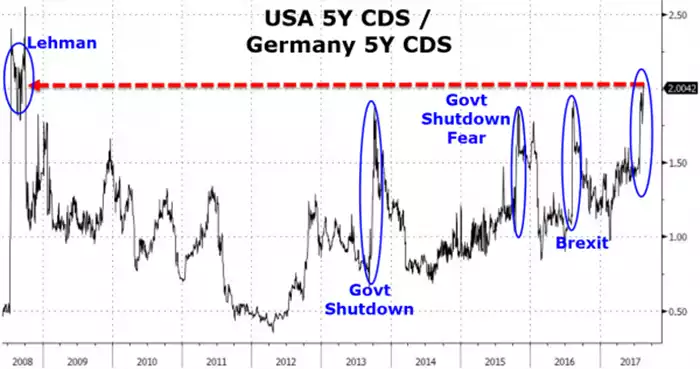US Debt Ceiling – 7 Days to Go
News
|
Posted 23/08/2017
|
7314
Debt ceiling standoffs are not a new thing to the US. Each time however they have ended up passing the bill in Congress to allow the US government to fund continual budget deficits, robbing future generations to pay for today’s excesses. We’ve quipped before, it’s not a debt ceiling but more like a debt target… they hit it every single time…
Let’s look at how we got here (again). Back in November 2015 Congress suspended the debt ceiling until 15 March 2017 meaning the statutory debt limit of the US government could not exceed the $19.8 trillion (yes, trillion!) at that day. Since then the US Treasury has bought time by what it calls ‘extraordinary measures’ which basically entails raiding federal pension funds. Steve Mnuchin, the US Treasury Secretary has just announced they run out of these measures by the end of this month, just 7 days away.
For further context they have raised the debt ceiling 78 times in the last 57 years so one could become complacent that it will just happen again. Once (essentially by accident) they didn’t, in 1979, and it cost the US around 0.6% in higher interest for an indefinite period. To see 0.6% increase now would cost them in the order of $1.2 trillion over the next 10 years. In 2011 we saw the ‘debt ceiling crisis’ standoff that resulted in Standard & Poors downgrading the credit rating of the US for the first time in history, the world’s reserve currency no less. In 2013 again there was a stalemate that saw the Government grind to a halt as public servants couldn’t be paid. More importantly, the world’s reserve currency looked on the brink of defaulting on its bonds, US Treasuries.
So why should we be worried this time? The New York Times put it well:
“First, the administration is confounded by inexperience, incompetence and infighting. Treasury Secretary Steven Mnuchin has little expertise in congressional stage management, but he understands the gravity of the situation and has lobbied for a clean debt ceiling bill — one without conditions or unnecessary amendments.
But that puts him in tension with his White House colleague Mick Mulvaney, the director of the Office of Management and Budget and a founding member of the Freedom Caucus, who has intimated that breaching the debt ceiling would not be that consequential, and who has argued that the must-pass legislation should be used to advance the hard right’s agenda. Without a firm signal from the White House that the debt ceiling should not be held hostage to political agendas, it will be hard to get Congress to do the right thing.
Every weekday, get thought-provoking commentary from Op-Ed columnists, the Times editorial board and contributing writers from around the world.
And that’s the second problem: Congress, and in particular the Freedom Caucus. As the health care fight showed, the caucus is fixated on cutting entitlement spending. It has made it clear that if the House leadership balks on their demands for major cuts in the 2018 budget, they’ll refuse to vote on raising the debt ceiling.
Finally, some conservative policy makers besides Mr. Mulvaney have convinced themselves that crashing into the debt ceiling won’t be a big deal because the government can “prioritize” its bill payments, so that interest on Treasury debt will be paid on a current basis, while other bills sit unpaid.”
Clearly the markets are more worried than the “it always resolves itself” camp as the relationship with the ‘other’ bond of choice, German bunds clearly illustrates below…
